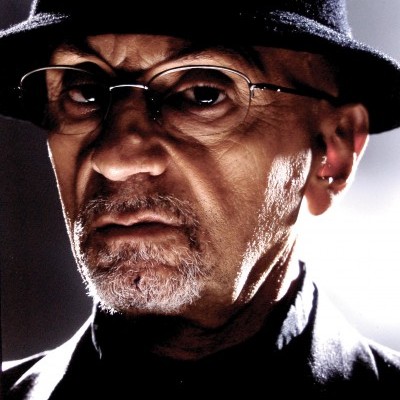
Tomasz Stańko
(Photo: Andrzej Tyszko)Wasilewski sat between his partners at a conference table in a meeting room in ECM’s Midtown Manhattan offices. Wasilewski and Kurkiewicz were 5 when the shipyard workers of Gdansk began the nationwide strike that would lead to the development of Solidarity, the first independent labor union to exist in the Eastern Bloc. When the Berlin Wall came down, they were 14.
“What happened in Poland in the ’60s did not influence us much,” said Miskiewicz, two years their junior.
“At the same time, our generation had to respect older musicians,” Wasilewski said. “Then in the ’90s, it became a DJ’s world, and it’s now popular to sample and mix music from Polish jazz from the ’60s. This generation realized that the ’60s were important.”
In February 1995, one year after they joined Stańko, before any of them had reached 20, the Simple Acoustic Trio recorded Komeda (Gowi), a mature recital of eight Komeda tracks. Compared to now, Wasilewski’s lines have more notes, the dialogue is more florid and the transitions are less sophisticated, but the group is recognizable. In contrast to the prevailing European ethos of eschewing blues and swing toward the end of constructing an individual tonal identity from local vernaculars, these musicians followed Stanko’s example on Komeda’s Astigmatic, engaging and responding to the building blocks of American post-bop modern jazz—McCoy Tyner, Herbie Hancock, Jarrett — on its own terms.
“It seemed like an obvious thing to do,” Wasilewski said of the repertoire. “We were listening to Komeda’ s quintet recording with Tomasz. He was in the air.”
“It was easy to play, easy to improvise,” Miskiewicz said. “After we made the recording, we started to be more interested in Komeda as a person, what his feelings might have been.”
“He was a window to explore the Polish roots we could be influenced by,” Kurkiewicz said. “But there was a big jazz scene, opposite to the system, and jazz was a synonym of freedom. It was common for jazz to be put into the movies — it wasn’t just Komeda.”
“Komeda wasn’t a virtuoso player, but it doesn’t matter,” Wasilewski said. “Thelonious Monk as well was not so technically great. But at the same time, Monk is one of the most important composers in jazz history. With Komeda it’s the same, but unfortunately he had an accident and died earlier than he should.”
Born in Koszalin, a city on the Baltic Sea, Wasilewski and Kurkiewicz met as 14-year-olds at a music academy in Katowice. “We were focusing on playing jazz, learning jazz every summer with Polish and also American teachers from Berklee College of Music.” At a workshop in 1993, they met Miskiewicz, then 16, and joined forces.
“We want to connect the European and American ways of playing—it doesn’t matter what either one means,” Wasilewski said.
It did seem to matter.
“Rubato tempo playing,” Wasilewski elaborated. “More influence from classical music. More influenced from different folk music — Bulgarian, Romanian, French and Norwegian. Polish, too, though we don’t like it; it’s not so inspiring. Hungarian is more entertaining, stranger, more attractive for us than for Hungarian people. Jazz for me is folk music.”
“We respect the traditional way of playing, and we respect the soul of it,” Miskiewicz said.
“From the beginning we did a lot of jazz and blues form, and it was our best form,” Wasilewski said. “Next we would like to work on developing forms.” He mentioned his admiration for outcats Alexander von Schlippenbach and Peter Brötzmann, with whom Stańko had played in the Globe Unity Orchestra.
“They use not only playing ability,” Kurkiewicz added. “They use the soul, the ghosts, the spirits.”
It seems that always, the whole history of art, people think that if you are old, art is over,” Stańko said. “In our time, everything was more rich, more intense. I try to be like Miles, a little under, a little downstairs, and see what’s really going on.”
Today’s musicians don’t face official censorship, as Stańko did during his youth in Poland. Perhaps the stakes were higher then.
“My generation don’t care about money like these young people now,” the trumpeter said. “But this is not important. The important thing is music. For this reason, I rely on musicians I play with to give me power. Billy Harper give me power. He was fresh in this band, playing free.”
Reflecting on the Komeda compositions that had inspired Harper the night before, Stańko reflected on the Polish cultural streams that inflect his and Komeda’s musical production. “We have a predisposition for anarchy, but also for lyricism, and that is in my music,” he said. “Maybe our weather, the same weather like today, a melancholic mood, a little depression coming from melancholic, but also an ‘agghhh’ coming from drinking too much.”
Drinking perhaps, but then there are the existential realities for Poles who lived first under German and then Soviet occupation. “My father had a quarter Jewish blood,” Stańko said. “In wartime, he was working in the administration of a Polish city. The Resistance was active, and the S.S. was taking people from the streets, and they make a line and every 10th person they shoot. Father had fast reflexes. He spoke German, and he started to speak to the Germans that he work in the city in this administration, and he’s musician. Then they said, ‘Go away.’ I don’t think he thought himself Jewish. I don’t, either, although I am happy that I have this blood. I also don’t feel much Polish. I feel international. I feel human.” DB